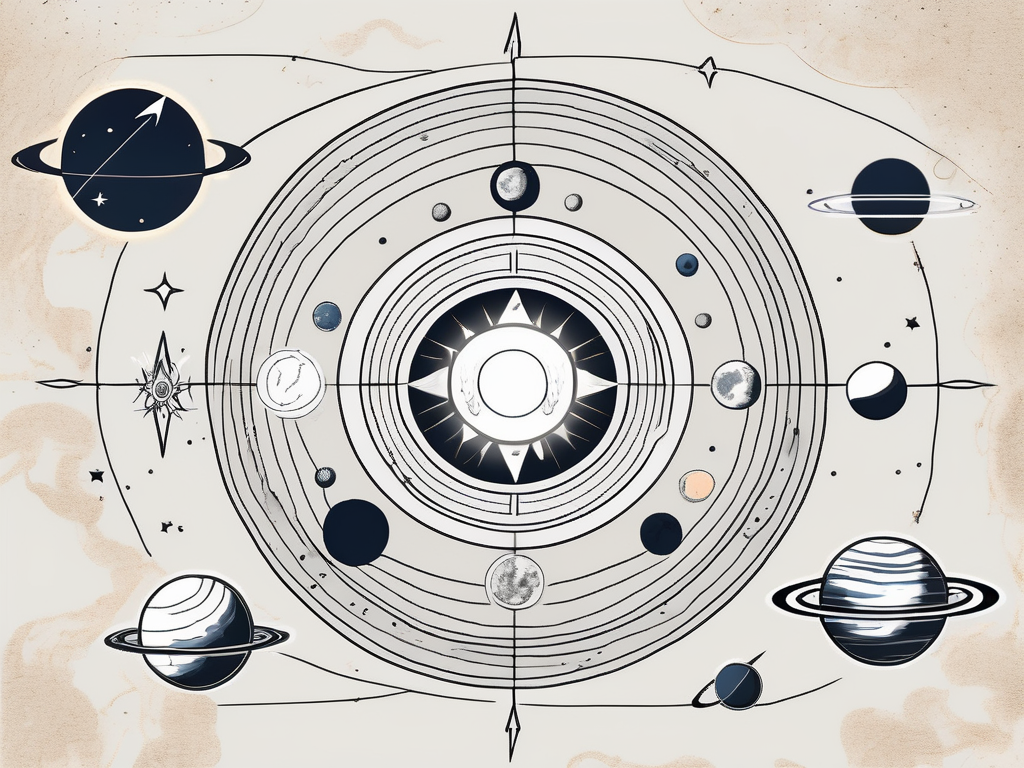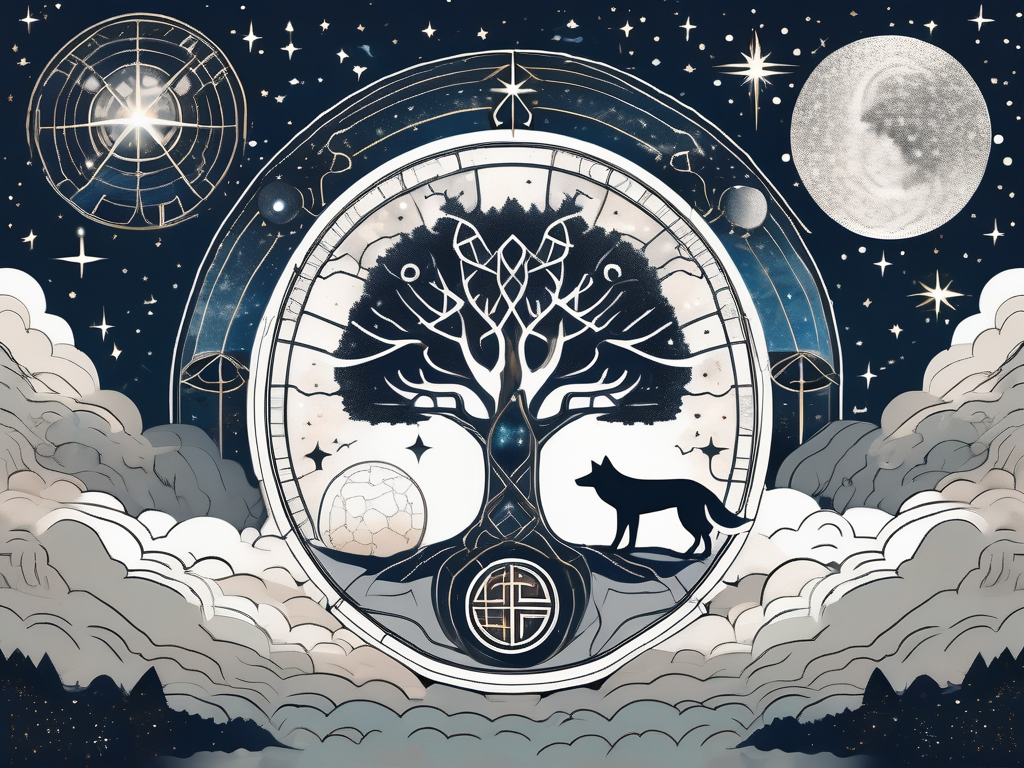Astrology has always fascinated people, offering insights and predictions about their lives based on the alignment of celestial bodies. But what does the Bible say about astrology? Is it considered a harmless curiosity or something more sinister? Let’s explore the concept of astrology and its interpretations in light of biblical teachings.
Understanding the Concept of Astrology
Before delving into the Bible’s perspective, it’s essential to grasp the concept of astrology. Astrology dates back thousands of years and has its roots in ancient civilizations. It is the belief that celestial objects, such as planets and stars, influence human affairs and personality traits.
Astrology is a fascinating field that has captivated the minds of people throughout history. The idea that the positions of celestial bodies can have an impact on our lives is both intriguing and thought-provoking. It is a concept that has been explored and studied by countless individuals, from ancient astrologers to modern-day enthusiasts.
Throughout history, astrology has undergone various adaptations and interpretations, making it a diverse and ever-evolving field. From horoscopes to birth charts, astrology seeks to explore the supposed connections between celestial bodies and human destinies. It offers a framework through which individuals can gain insight into themselves and the world around them.
The Origins of Astrology
Astrology finds its origins in ancient Mesopotamia, Egypt, and Greece. These early civilizations observed the patterns of the stars and developed intricate systems to interpret their significance. The study of astrology was not merely a pastime for these ancient cultures but a serious endeavor that shaped their understanding of the world.
Ancient astrologers believed that by studying the positions of celestial bodies, they could gain insight into the future and understand their place in the cosmos. They saw the movements of the planets and stars as a reflection of the divine order, influencing everything from individual lives to the fate of nations.
As time passed, the practice of astrology spread to other cultures, gaining popularity worldwide. Each civilization added its own unique perspectives and interpretations, enriching the field and deepening its complexity.
Astrology in Modern Times
In our contemporary era, astrology has experienced a resurgence. Many people turn to horoscopes and astrology readings for guidance and self-reflection. The availability of astrological information online has further contributed to this trend, making it easily accessible to anyone with an internet connection.
People find comfort and meaning in astrology, as it offers a way to navigate life’s uncertainties and understand oneself better. It provides a language through which individuals can explore their strengths, weaknesses, and potentials. Astrology has become a tool for personal growth and self-discovery, helping people make sense of their experiences and find a sense of purpose.
However, astrology’s popularity doesn’t mean it is endorsed by all cultures or religions. For instance, prominent religious texts, such as the Bible, offer distinct perspectives on astrology that believers often consider when forming their own opinions. It is important to recognize and respect the diversity of beliefs and interpretations surrounding astrology.
As society continues to evolve, so too will our understanding and engagement with astrology. Whether one sees it as a science, a form of entertainment, or a spiritual practice, astrology remains a captivating subject that sparks curiosity and invites exploration.
Biblical Perspectives on Astrology
The Bible provides glimpses into the ancient Jewish and Christian understandings of astrology. Let’s explore some notable references from the Old and New Testaments.
Astrology, the study of celestial phenomena and its supposed influence on human affairs, has a complex relationship with the Bible. In the Old Testament, several passages mention celestial phenomena and astrological practices. However, these references primarily condemn astrology, considering it a form of idolatry or divination.
For example, in Deuteronomy 4:19, the Bible warns against worshiping the sun, moon, stars, or any celestial object. It emphasizes that such acts are detestable to God. This condemnation reflects the belief that astrology detracts from the worship of the one true God and places undue importance on created things.
The book of Isaiah also criticizes those who rely on astrology, stating, “Let your astrologers come forward, those stargazers who make predictions month by month, let them save you from what is coming upon you” (Isaiah 47:13 NIV). This passage highlights the futility of relying on astrological predictions for protection or guidance, instead emphasizing trust in God’s providence.
While the Old Testament generally discourages astrology, the New Testament contains fewer references to the practice. However, one instance stands out – the account of the Magi visiting the baby Jesus in Matthew 2:1-12. The Magi, likely astrologers or wise men from the East, followed a unique star that led them to the Messiah.
This event demonstrates the star’s significance, but it is crucial to note that the focus is on God’s divine plan rather than endorsing astrology as a guiding practice. The star served as a sign to the Magi, pointing them towards the fulfillment of God’s promise in the birth of Jesus Christ.
It is important to approach biblical perspectives on astrology with caution and discernment. While the Bible acknowledges celestial phenomena and the role they played in specific events, it consistently emphasizes the worship of God alone and discourages the reliance on astrology for guidance or divination.
Ultimately, the Bible encourages believers to seek wisdom and guidance from God through prayer, Scripture, and the Holy Spirit, rather than placing trust in astrological practices that may lead to idolatry or a distorted understanding of God’s sovereignty.
Theological Interpretations of Astrology
Throughout history, theologians and religious scholars have tackled the theological implications of astrology. Let’s explore two significant perspectives – astrology and free will and astrology and divine providence.
Astrology and Free Will
One theological concern related to astrology is its potential conflict with the concept of free will. Critics argue that if astrology predicts one’s fate, it undermines individual freedom and choice.
However, it is important to note that the relationship between astrology and free will is not a straightforward one. While astrology may provide insights into potential patterns and influences, it does not determine an individual’s actions or decisions.
Instead, astrology can be seen as a tool for self-reflection and self-awareness. By understanding the cosmic energies at play, individuals can make informed choices that align with their values and aspirations. In this way, astrology can actually empower individuals to exercise their free will more effectively.
Furthermore, astrology can also serve as a reminder that life is a complex interplay of various factors, including personal agency and external influences. It encourages individuals to take responsibility for their actions while recognizing that they are part of a larger cosmic tapestry.
Astrology and Divine Providence
Others reconcile astrology with divine providence, acknowledging that God is ultimately in control. They propose that God’s providence may encompass the use of celestial bodies and their influence.
From this perspective, astrology serves as a reminder of God’s power and order in the universe. By studying the movements of the stars and planets, individuals can gain a deeper appreciation for the intricate design of creation.
Moreover, astrology can be seen as a language through which God communicates with humanity. Just as God spoke through prophets and scriptures, astrology can be interpreted as a divine message encoded in the celestial movements.
However, it is important to approach astrology with discernment and prioritize a relationship with God over dependence on astrological guidance. While astrology can offer insights and guidance, it should not replace personal faith and trust in God’s providence.
Ultimately, the theological interpretations of astrology are diverse and complex. They reflect the ongoing dialogue between faith and reason, as theologians grapple with the mysteries of the universe and our place within it.
Astrology and Christian Beliefs
In Christian history, astrology has faced varying levels of acceptance and rejection. Let’s explore how astrology was perceived in the early church and contemporary Christian views.
Astrology in the Early Church
During the early years of Christianity, astrology encountered skepticism. Early church fathers, such as Tertullian and Augustine, viewed astrology as incompatible with Christian beliefs.
They argued that Christians should trust in God’s providence rather than rely on astrological predictions. Moreover, they opposed associating astrology with worship or divination, as it contradicted monotheistic principles.
As the early church developed its theology, it sought to distance itself from pagan practices, including astrology. The focus shifted towards a personal relationship with God and the belief in His divine guidance.
Early Christian leaders emphasized the importance of faith in God’s plan and discouraged the reliance on astrological interpretations. They believed that true wisdom and understanding could only be attained through prayer, scripture, and the guidance of the Holy Spirit.
Despite the skepticism towards astrology, there were instances where some early Christians engaged with it. For example, the Magi, who visited the baby Jesus, were believed to be astrologers. However, this event is seen as an exception rather than a validation of astrology.
Contemporary Christian Views on Astrology
In contemporary times, Christian views on astrology remain diverse. Some Christians reject astrology as incompatible with their faith, adhering to the teachings of early church fathers. They emphasize the importance of trusting God rather than seeking guidance from celestial bodies.
These Christians argue that astrology can lead to a misplaced focus on the stars and planets, diverting attention from God. They believe that seeking guidance from astrology can undermine one’s faith and trust in God’s plan.
On the other hand, there are Christians who adopt a more tolerant approach, perceiving astrology as a tool for self-reflection and understanding human nature. They believe that astrology can provide insights into personality traits, strengths, and weaknesses.
However, these Christians caution against idolizing astrology or allowing it to replace trust in God’s plan. They emphasize that astrology should be approached with discernment and used as a means of self-exploration rather than a source of absolute truth.
It is important to note that the acceptance or rejection of astrology among Christians varies across denominations and individual beliefs. Some denominations have issued official statements discouraging the practice of astrology, while others have taken a more neutral stance, leaving it up to the individual’s conscience.
Ultimately, the relationship between astrology and Christian beliefs continues to be a topic of debate and personal interpretation within the Christian community.
The Bible’s Warnings Against Astrology
While the Bible’s perspective on astrology may not be explicit in every verse, it offers warnings against relying solely on astrological practices.
Astrology, the belief that celestial objects can provide insight into human behavior and predict future events, has been a topic of debate among believers for centuries. Some argue that astrology is a harmless form of entertainment or a tool for self-reflection, while others view it as a form of divination or seeking guidance from sources other than God.
However, biblical passages denounce forms of divination and seeking guidance from celestial objects. These warnings serve as a reminder to prioritize one’s relationship with God and rely on His wisdom rather than human-made systems.
Biblical Passages Condemning Astrology
Throughout the Bible, there are several passages that explicitly condemn practices such as astrology. In the book of Deuteronomy, it is written, “Let no one be found among you who… practices divination or sorcery, interprets omens, engages in witchcraft, or casts spells” (Deuteronomy 18:10-11, NIV).
Similarly, in the book of Isaiah, it is stated, “You are wearied with your many counsels; let them stand forth and save you, those who divide the heavens, who gaze at the stars, who at the new moons make known what shall come upon you” (Isaiah 47:13, ESV).
These passages, among others, make it clear that seeking guidance from celestial objects or relying on astrological predictions is not aligned with God’s will.
The Dangers of Relying on Astrology According to the Bible
While astrology may seem harmless to some, the Bible cautions against placing undue trust in it or other forms of divination. Instead, it encourages believers to seek guidance from God through prayer, scripture, and the Holy Spirit.
One danger of relying exclusively on astrological predictions is that it may limit one’s ability to fully embrace God’s plans and intentions. By putting faith in the alignment of the stars rather than in God’s wisdom, individuals may miss out on the opportunities and blessings that God has in store for them.
Furthermore, the Bible teaches that God’s wisdom surpasses any perceived worldly knowledge. In the book of Proverbs, it is written, “Trust in the LORD with all your heart, and do not lean on your own understanding” (Proverbs 3:5, ESV). This verse reminds believers to place their trust in God rather than in human-made systems.
Ultimately, the warnings against astrology in the Bible serve as a reminder for believers to seek God’s guidance and wisdom above all else. By prioritizing their relationship with Him and relying on His direction, believers can find true fulfillment and purpose in their lives.
Conclusion
As we conclude our exploration of what the Bible says about astrology, we find that it approaches the subject with caution. While the Bible acknowledges the existence of celestial phenomena, it discourages relying solely on astrology for guidance or divination.
Christian interpretations of astrology vary, but they often emphasize the significance of free will, divine providence, and personal relationship with God. Believers are encouraged to approach astrology with discernment and prioritize a deeper understanding of God’s plans and teachings.
Ultimately, whether you choose to engage with astrology or not, it is crucial to uphold your faith and rely on God’s wisdom as the guiding force in your life.












